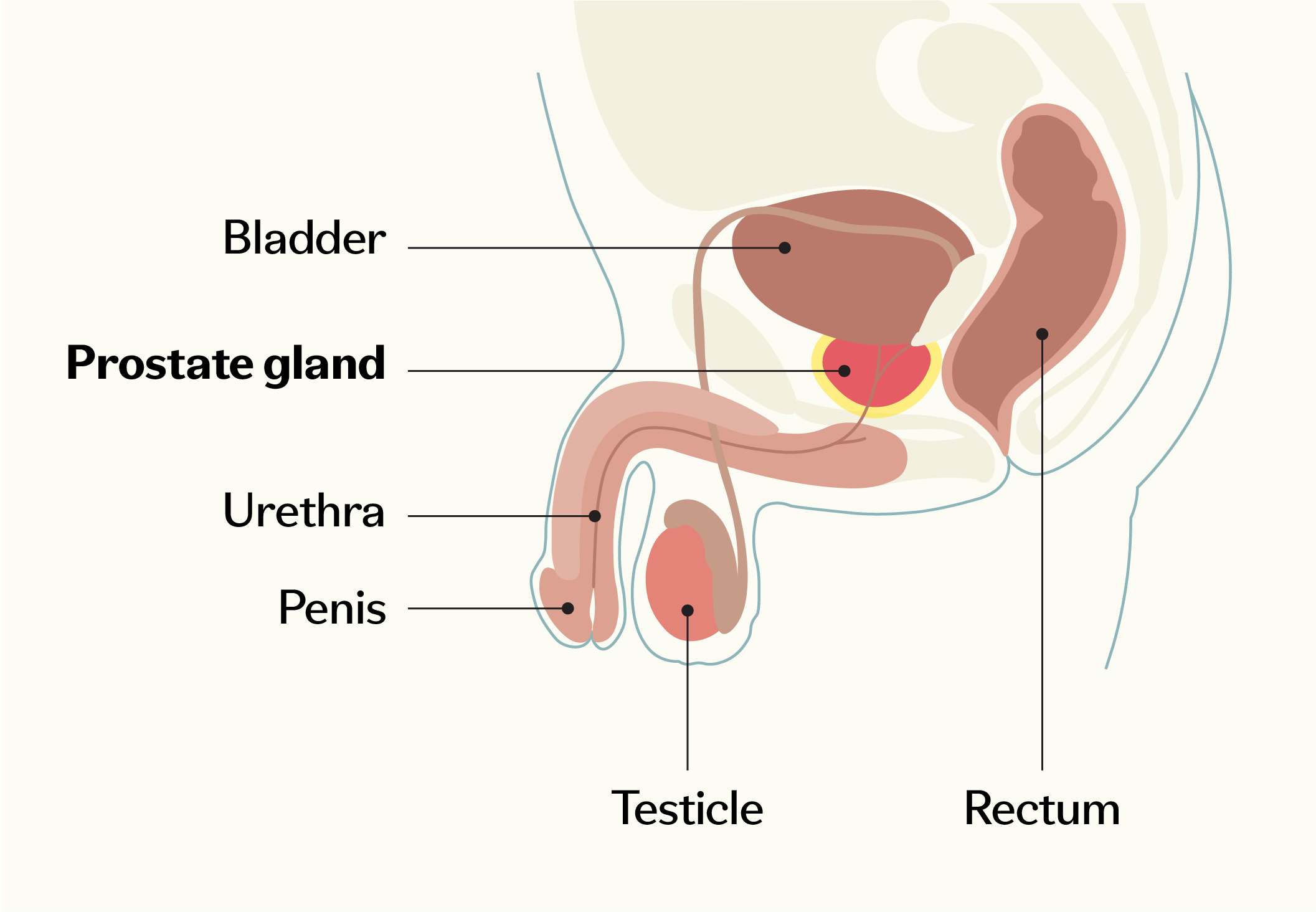The prostate
The prostate (also known as the prostate gland) is a body part found in men, near the bottom of the bladder. The prostate makes a fluid that mixes with sperm from the testicles to make semen.1

The term ‘male’ used on this page refers to anyone who may have a prostate. This includes trans females, some intersex people and some people who identify as non-binary.
People who are assigned female at birth do not have a prostate gland.
How prostate cancer starts
Prostate cancer is a common cancer – in the UK, around 52,000 people are diagnosed with it each year.*1 It is more common in people over the age of 65.2
It starts when cells in the prostate begin to grow and divide uncontrollably, forming tumours.1
The exact cause of prostate cancer is unknown. But age, family history of prostate cancer and ethnicity can influence the chances of prostate cancer developing.3
*Estimate based on the average number of people diagnosed with prostate cancer in the UK each year between 2016 and 2018.
Types of prostate cancer
There are different types of prostate cancer based on which type of cell the cancer started in.4
This is the most common type of prostate cancer. It develops in the gland cells that line the prostate gland and the tubes of the prostate gland.4
This begins in the cells covering the prostate. It tends to grow faster than adenocarcinoma.4
This is a rare form of prostate cancer that occurs in less than 2 in every 100 (less than 2%) patients with prostate cancer. It starts in the cells that make hormones in the prostate.5
Also known as urothelial cancer, it usually begins in the bladder and spreads to the prostate.4
Treatment options for prostate cancer
The exact treatment someone has depends on a number of things, including the type and stage of the cancer (meaning how big the cancer is and whether it has spread to another part of the body), the person’s overall health and age, and the risk group of the cancer.2
Common treatment options for prostate cancer include:2
- Observation/monitoring: This involves closely monitoring the cancer without any immediate treatment. It is an option for slow-growing prostate cancers
- Surgery: A surgical procedure to remove the prostate gland is usually recommended if the cancer hasn’t spread beyond the prostate6
- Radiation therapy: This uses high-energy rays to target and kill cancer cells. It's an option for both early-stage and advanced prostate cancer
- Hormone therapy: Aims to reduce levels of a hormone called testosterone, which can fuel prostate cancer growth. It helps slow the cancer's growth
- Chemotherapy: Uses anti-cancer drugs to kill cancer cells, and tends to be used for advanced prostate cancers
Facing a prostate cancer diagnosis can be challenging, but understanding your condition and the options available can empower you to make informed decisions about your care.
Remember, support is always available from healthcare professionals, cancer support groups and loved ones. You're not alone in this, and there's a supportive community ready to guide you every step of the way.

If you or someone you know has been diagnosed with cancer, support groups and charities are great places to find information and connect with people going through a similar experience.

Life with cancer is different for everyone. So, if you need support, it should be personal to you. ByYourSide has been created by Pfizer to offer you practical support and guidance to help you manage life with cancer in a way that is best for you.
References
- Cancer Research UK. What is prostate cancer? Available at: https://www.cancerresearchuk.org/about-cancer/prostate-cancer/about [Accessed May 2025].
- Macmillan. Prostate cancer. Available at: https://www.macmillan.org.uk/cancer-information-and-support/prostate-cancer [Accessed May 2025].
- Macmillan. Causes and risk factors of prostate cancer. Available at: https://www.macmillan.org.uk/cancer-information-and-support/prostate-cancer/causes-and-risk-factors-of-prostate-cancer [Accessed May 2025].
- Cancer Research UK. Types of prostate cancer. Available at: https://www.cancerresearchuk.org/about-cancer/prostate-cancer/stages/types [Accessed May 2025].
- Cancer Research UK. Small cell prostate cancer. Available at: https://www.cancerresearchuk.org/about-cancer/prostate-cancer/stages/types/small-cell-prostate-cancer [Accessed May 2025].
- Macmillan. Prostatectomy for prostate cancer. Available at: https://www.macmillan.org.uk/cancer-information-and-support/treatments-and-drugs/prostatectomy-for-prostate-cancer [Accessed May 2025].
